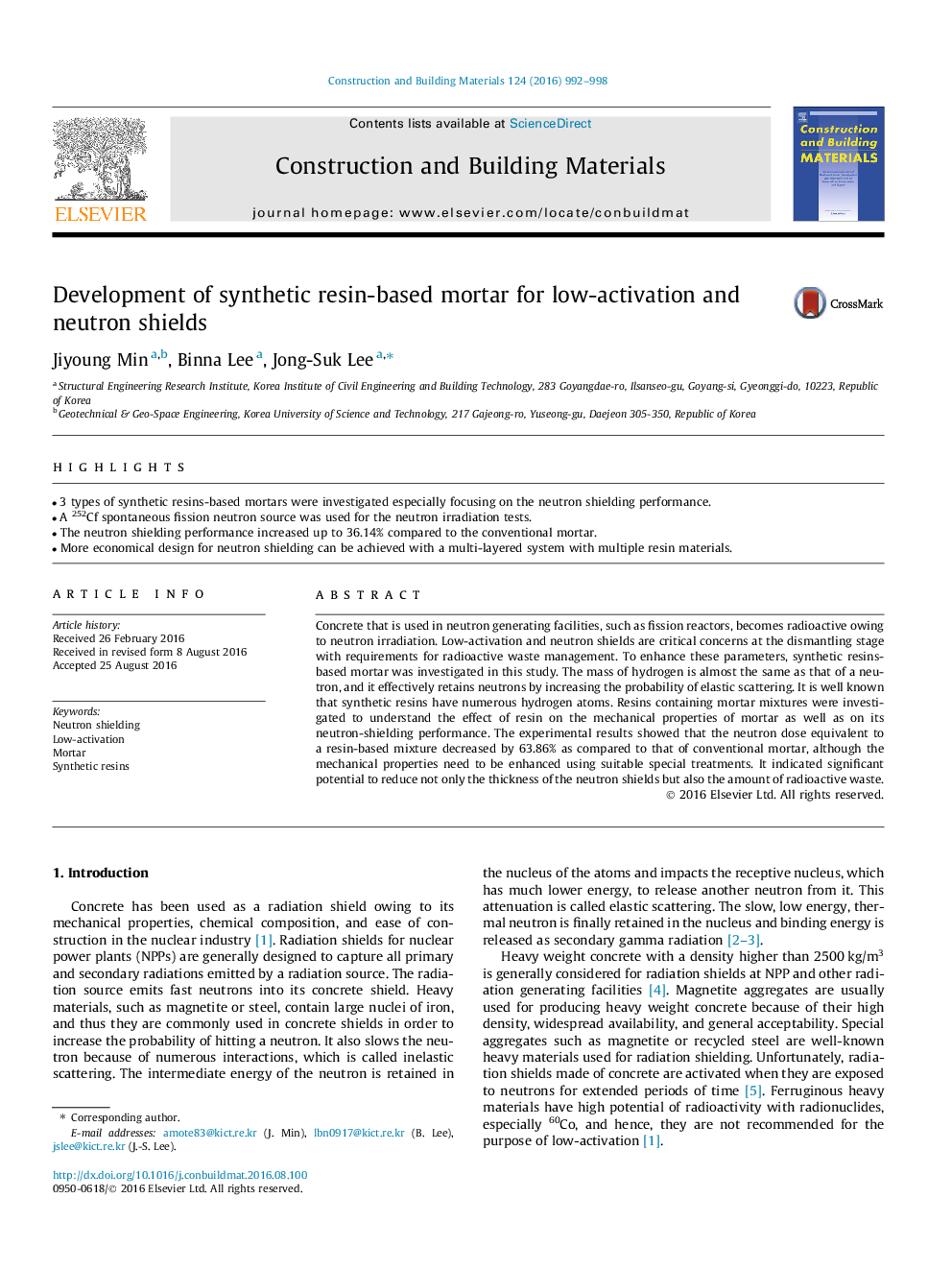| کد مقاله | کد نشریه | سال انتشار | مقاله انگلیسی | نسخه تمام متن |
|---|---|---|---|---|
| 6718122 | 503529 | 2016 | 7 صفحه PDF | دانلود رایگان |
عنوان انگلیسی مقاله ISI
Development of synthetic resin-based mortar for low-activation and neutron shields
ترجمه فارسی عنوان
توسعه ملات سیمان مصنوعی برای کم فعال سازی و سپر نوترون
دانلود مقاله + سفارش ترجمه
دانلود مقاله ISI انگلیسی
رایگان برای ایرانیان
کلمات کلیدی
محافظت از نوترون، کم فعال شدن ملات، رزین های مصنوعی،
ترجمه چکیده
بتون که در تاسیسات تولید نوترون مانند راکتورهای شکافت استفاده می شود، به علت تابش نوترون، رادیواکتیو می شود. سپرهای کم فعال و سپر نوترونی نگرانی های مهمی در مرحله انهدام با الزامات مدیریت زباله رادیواکتیو هستند. برای افزایش این پارامترها، ملات بر اساس رزین های مصنوعی در این مطالعه مورد بررسی قرار گرفت. جرم هیدروژن تقریبا همانند یک نوترون است و به طور موثر باعث افزایش احتمال پراکندگی الاستیک می شود. به خوبی شناخته شده است که رزین های مصنوعی اتم های هیدروژن زیادی دارند. رزین های حاوی مخلوط ملات برای درک اثر رزین بر خواص مکانیکی ملات و نیز بر عملکرد نوترون محافظتی آنها مورد بررسی قرار گرفت. نتایج تجربی نشان داد که دوز نوترونی برابر با مخلوط مبتنی بر رزین به میزان 63.86٪ نسبت به رزین معمولی کاهش یافته است، اگرچه خواص مکانیکی باید با استفاده از روش های مناسب مناسب افزایش یابد. این نشان دهنده توانایی قابل توجهی برای کاهش ضخامت سپر نوترونی و همچنین میزان دفع زباله های رادیو اکتیو بود.
موضوعات مرتبط
مهندسی و علوم پایه
سایر رشته های مهندسی
مهندسی عمران و سازه
چکیده انگلیسی
Concrete that is used in neutron generating facilities, such as fission reactors, becomes radioactive owing to neutron irradiation. Low-activation and neutron shields are critical concerns at the dismantling stage with requirements for radioactive waste management. To enhance these parameters, synthetic resins-based mortar was investigated in this study. The mass of hydrogen is almost the same as that of a neutron, and it effectively retains neutrons by increasing the probability of elastic scattering. It is well known that synthetic resins have numerous hydrogen atoms. Resins containing mortar mixtures were investigated to understand the effect of resin on the mechanical properties of mortar as well as on its neutron-shielding performance. The experimental results showed that the neutron dose equivalent to a resin-based mixture decreased by 63.86% as compared to that of conventional mortar, although the mechanical properties need to be enhanced using suitable special treatments. It indicated significant potential to reduce not only the thickness of the neutron shields but also the amount of radioactive waste.
ناشر
Database: Elsevier - ScienceDirect (ساینس دایرکت)
Journal: Construction and Building Materials - Volume 124, 15 October 2016, Pages 992-998
Journal: Construction and Building Materials - Volume 124, 15 October 2016, Pages 992-998
نویسندگان
Jiyoung Min, Binna Lee, Jong-Suk Lee,
